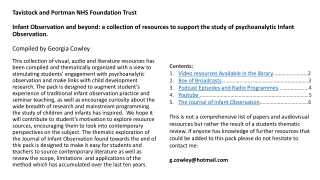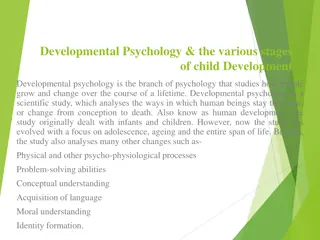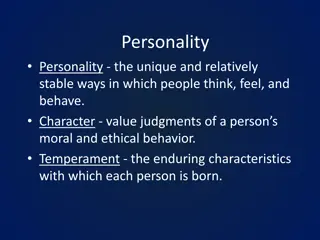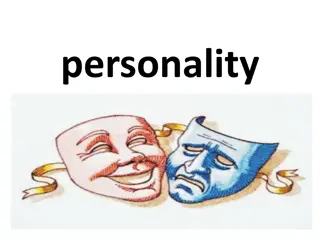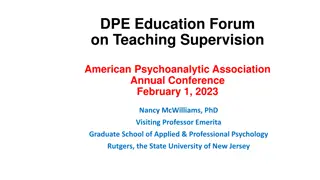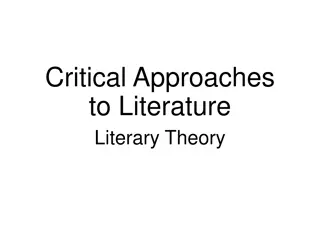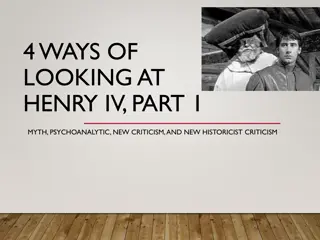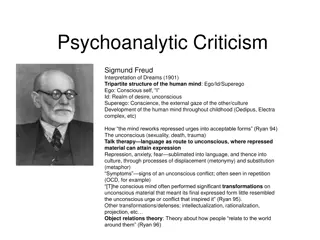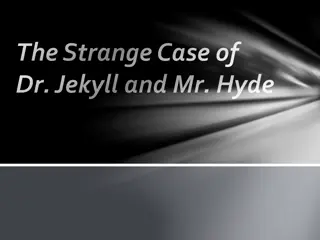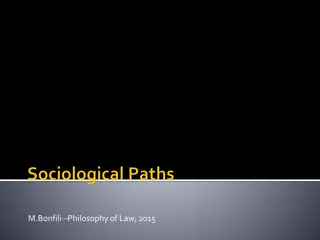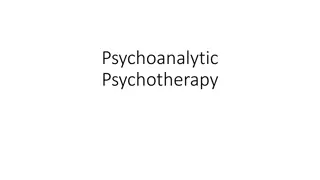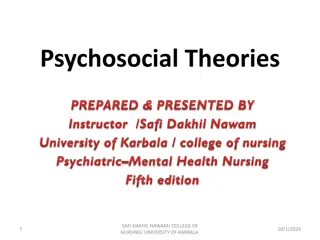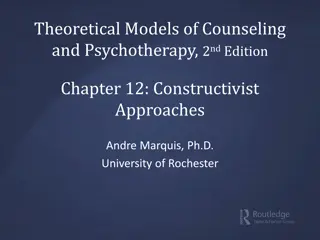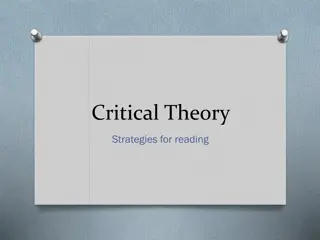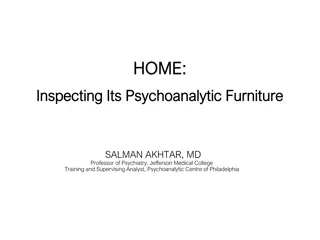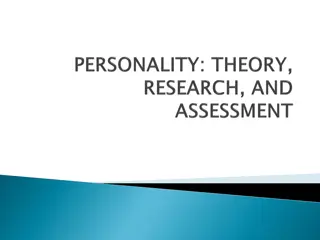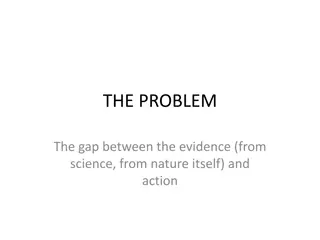Exploring Psychoanalytic Infant Observation: A Resource Collection
Discover a curated collection of visual, audio, and literature resources compiled to enhance the study of psychoanalytic infant observation and its relation to child development. This resource pack aims to engage students with contemporary perspectives, encourage exploration of research sources, and
0 views • 33 slides
Understanding Developmental Psychology: Various Stages of Human Development
Developmental psychology is a scientific study analyzing how individuals evolve from infancy to old age. It encompasses physical and psychological processes, problem-solving, language acquisition, moral understanding, and identity formation. Major theories like psychoanalytic, behavioristic, and cog
0 views • 10 slides
Understanding Personality: Freud's Psychoanalytic Theory
Personality encompasses unique ways individuals think, feel, and behave. Sigmund Freud's psychoanalytic theory explores the divisions of consciousness, parts of personality (Id, Ego, Superego), and stages of personality development. Freud's theory delves into the role of unconscious thoughts, desire
1 views • 41 slides
Understanding Personality: Theories and Components Explained
Personality is the unique and enduring characteristics that define individuals, influencing their behavior consistently over time. Explore the origins of personality from the Latin word 'persona' meaning 'mask', and delve into major perspectives such as psychoanalytic, trait, humanistic, and social-
1 views • 45 slides
Psychoanalytic Supervision: Integrative Approach and Practical Guidance
This comprehensive overview by Nancy McWilliams, PhD, explores various aspects of mental health supervision, including different styles of supervision, ethical considerations, and individual differences. She addresses the historical context, psychological evaluation in treatment progress, and the im
1 views • 62 slides
Understanding Psychological Theories of Criminal Behavior
Psychologically-based criminologists attribute criminal behavior to individual factors such as negative early childhood experiences and inadequate socialization, leading to criminal thinking patterns and incomplete cognitive development. Probation and parole practices are influenced by rehabilitatio
0 views • 30 slides
Understanding Dreams: Exploring Theories and Meanings
Dreams have intrigued philosophers for centuries, with recent scientific research shedding light on their significance. While the purpose of dreams remains debated, various theories like Freud's psychoanalytic perspective offer insights into how dreams may be linked to our subconscious desires and t
0 views • 9 slides
Critical Approaches to Literature and Literary Theory
Explore different critical approaches to studying literature, including Reader-Response Criticism, Formalist Criticism, Psychological/Psychoanalytic Criticism, Sociological Criticism, and more. Dive into questions of how we read, interpret, and perceive meaning in texts, considering the impact of vi
1 views • 20 slides
Exploring Different Perspectives on Henry IV, Part 1 Through Myth, Psychoanalytic, New Criticism, and New Historicist Criticism
Delve into various critical lenses such as myth, psychoanalytic, New Criticism, and New Historicist Criticism to analyze Henry IV, Part 1. Uncover the mythic origins of characters like Falstaff, connections to ancient rituals, and the symbolism of killing the king. Discover how literature intertwine
4 views • 26 slides
Exploring Critical Theory Through Literary Criticism and Analogy
Delve into the realm of critical theory through literary criticism, using the analogy of different perspectives on seeing an orange to understand the various facets of analysis like reader response, Marxist/social power, feminist/gender, and psychoanalytic criticism. Discover how critical theory hel
0 views • 9 slides
Overview of Psychoanalytic Criticism and Object Relations Theory
Psychoanalytic Criticism, originating with Sigmund Freud and further developed by Melanie Klein and Jacques Lacan, explores the intricate workings of the human mind, delving into the tripartite structure of the ego, id, and superego. The theory encompasses concepts such as the interpretation of drea
0 views • 10 slides
Insights into "The Strange Case of Dr. Jekyll and Mr. Hyde" by Robert Louis Stevenson
Explore the intriguing background and themes behind Robert Louis Stevenson's famous novella, including the duality of human nature, Victorian England's societal norms, and the influence of contemporary ideas such as Charles Darwin's theory of evolution and Sigmund Freud's psychoanalytic concepts. Di
0 views • 10 slides
Understanding Gender Socialization Theories and Impact on Identity Formation
The discussion delves into the criticism of naturalistic paradigms in understanding gender identity, emphasizing the societal role in shaping individual perceptions. It explores three theories of gender socialization - Psychoanalytic theory, Social learning theory, and Cognitive developmental theory
0 views • 62 slides
Understanding Psychoanalytic Psychotherapy
Psychoanalytic psychotherapy aims to increase adaptive functioning by reducing symptoms, resolving conflicts, and fostering self-reflection. The therapy involves making the unconscious conscious, strengthening the ego, and exploring childhood experiences to increase self-awareness. Therapists mainta
0 views • 63 slides
Evolution of Cognitive Counseling and Aaron T. Beck's Contribution
In the historical context following World War II, a shift occurred in psychology towards cognitive counseling with the emergence of cognitive therapy by Aaron T. Beck. Beck, a psychoanalytically trained psychiatrist, challenged traditional psychoanalytic concepts and developed cognitive therapy to t
0 views • 26 slides
Overview of Psychoanalytic Theories in Psychiatric Mental Health Nursing
Explore the fundamental beliefs and treatment modalities of psychosocial theories such as psychoanalytic, developmental, behavioral, existential, and crisis intervention. Learn about the influence of these theories on current nursing practices, with a focus on the foundational contributions of Sigmu
0 views • 40 slides
Constructivist Approaches in Counseling and Psychotherapy: A Philosophical Perspective
Constructivist approaches in counseling and psychotherapy emphasize the ongoing process of structuring experiences to create meaning. This perspective involves philosophical underpinnings from thinkers such as the Buddha, Immanuel Kant, and Jean Piaget, highlighting the role of individual constructi
0 views • 35 slides
Exploring Critical Theory Strategies in Literary Analysis
Delve into the diverse approaches of Critical Theory to interpret and analyze literary works with new lenses. From Formalist and Biographical Criticism to Historical and Marxist perspectives, uncover hidden layers and meanings in texts through multiple viewpoints. Explore the role of psychoanalytic
0 views • 24 slides
Reflections on the Significance of Home in Psychoanalytic Theory
Explore the intricate connections between the concept of 'home' and psychological well-being through the lens of psychoanalytic theory. From Freud's views on the symbolic nature of home to Winnicott's emphasis on the role of the environment in shaping one's sense of security, delve into the profound
0 views • 10 slides
Understanding Personality: The Freudian Perspective
Personality refers to an individual's unique behavioral traits, which can be categorized into specific traits like openness, conscientiousness, extraversion, agreeableness, and neuroticism. Various theories, including Freud's psychoanalytic theory, attempt to explain personality by focusing on uncon
0 views • 24 slides
Challenges in Addressing the Gap Between Evidence and Action
Society's struggle to bridge the gap between scientific evidence and effective action is hindered by cognitive biases, emotional neglect, and a cultural disregard. The narrative touches on human rationality limits, societal influences, psychoanalytic perspectives, narcissistic tendencies, and the ch
0 views • 29 slides
